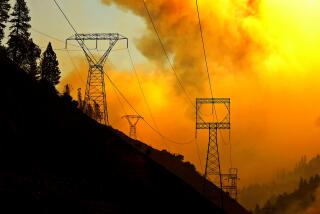Glut Is a Four-Letter Word
- Share via
Two items in the news recently illustrate how dramatically conditions have changed in a handful of years since the energy crisis of 1979-80.
In Los Angeles, Pacific Lighting Corp. announced its withdrawal as a partner in the dormant $40-billion project to pipe natural gas from the North Slope of Alaska to the Lower 48 states. For a variety of market reasons, existing gas supplies are believed to be adequate for the near future without construction of the costly 4,800-mile Alaska Natural Gas Transportation System.
And in Telluride, Colo., the town council placed a six-month moratorium on the installation of new wood-burning stoves. As Americans searched for ways to conserve petroleum during the energy crisis, millions of them discovered, or rediscovered, the aesthetic pleasures as well as the practicalities of a crackling wood fire, particularly at the end of a skiing day in the Colorado Rockies. But, with a change in priorities, wood-burning has been curbed in many areas because of its air pollution.
These isolated events meld into a familiar pattern over the past five years. The oil crisis suddenly turned into what some call a glut. Prices stabilized and then fell. Coincidentally, and for some of the same reasons, natural-gas supplies improved. Natural-gas prices have increased, but not to the levels that would have been charged for Alaskan gas or the liquefied natural gas that Pacific Lighting had planned to import from Indonesia.
Some businesses and families continue to pursue conservation and alternative energy sources for their own economic reasons, but many do not. The novelty of wood as a primary energy source has faded. The pleasures of a fireplace on a chill evening remain, although pollution is a problem in Telluride and some other localities.
In sum, the nation has become smug again about energy. With little support from the Administration, Synthetic Fuels Corp. has barely functioned. The new budget would reduce conservation programs again, and would halt indefinitely the further filling of the Strategic Petroleum Reserve. There is no plan for the use of the reserve should the need arise. “Administration policy for dealing with disruptions in oil supplies is to rely on market forces,” the 1986 budget says. First-come, first-served? Sell to the highest bidder? No one knows.
It is easy to snicker at OPEC sheiks as they struggle to maintain influence over the world market. But gasoline demand is on the rise again, and fuel-oil dealers are dipping into inventories. Imports were down in January, but the United States still bought an average of 5.3 million barrels a day of crude and petroleum products from abroad. European demand will increase as the economy recovers and the dollar falls.
Glut was an ill-chosen word that has lulled us back into a false sense of energy security. It has been a temporary surplus that can end, the American Petroleum Institute says, “in a surprisingly short period.” If or when another shortage occurs, we will not be much better prepared to cope than we were before.
Just in case, the folks of Telluride might hang onto their wood stoves.
More to Read
Sign up for Essential California
The most important California stories and recommendations in your inbox every morning.
You may occasionally receive promotional content from the Los Angeles Times.













